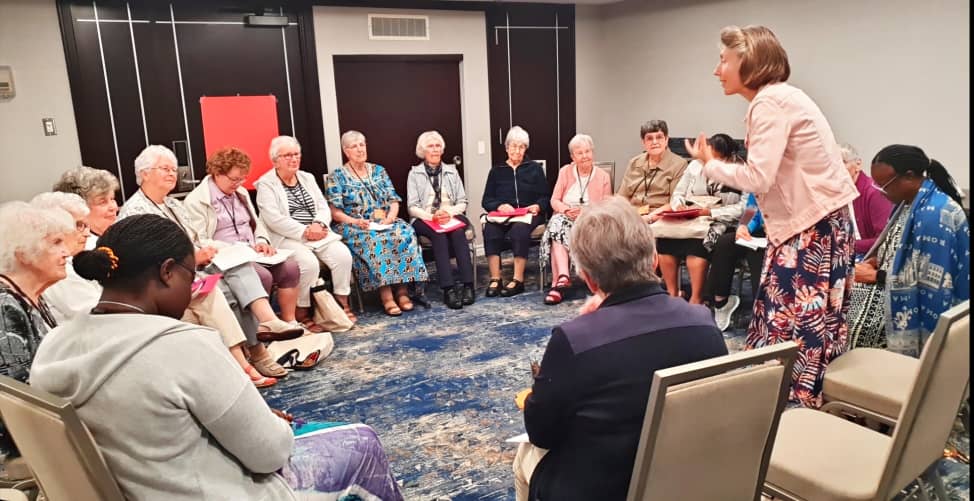CND Forum – Day5 – Wednesday August 28
Notre –Dame-des-Apôtres Region gathered us in with a hymn to the glory of God, expressing gratitude for the beauty of creation and our place within it and after a reading from scripture led us in singing a response to prayers of intercession. It was a beautiful beginning to this day.
In the morning presentation Maika Sondarjee helped us to understand that inequalities and injustices did not just appear, they have been created and our task is to deconstruct the process of colonialization in order to re-humanize our relationships. She pointed out that this is a huge undertaking because our society is part of the problem. We will need to look at how we think, communicate and even imagine because how we structure and use language has been shaped by colonialism. This work takes time and we will continue to make mistakes. Therefore, as we commit ourselves to “radical solidarity”, we must remain open to welcoming feedback and correction remembering that not everything is within our reach. All we should expect of ourselves is “to try to do better”.
Using the work of Charles W. Mills, historian Aly Ndiaye (BTW He is also a rapper whose alias is Webster) provided an overview of The Racial Contract. This is different from, but connected to, The Social Contract theory that was developed during the Age of Enlightenment to answer the question: How did human society come about? The Social Contract is a metaphor or allegory that describes an ideal society. However, the Racial Contract is non-ideal, can be documented in moments from history and seen in action. It frames a male white world, ignoring white women and objectifying all non-white persons through violence and ideological conditioning. This Racial Contract props up the economic, political and religious framework of the Social Contract. So at a time when Emmanuel Kant was arguing for the intrinsic value of the individual, the non-white people were seen as less than fully human and subjected to the violence of the slave trade and the genocidal policies used with Indigenous Populations.
This was also a time when scientists began scrutinizing, describing and categorizing the world around them. They looked at, divided and sub-divided the human family into “Racial groups” characterized by specific features and intellectual capacities. This “made-made” construct led to the idea of separate races and becomes the foundation for the Racial Contract and racism.
The Racial Contract is served by a mechanism of alienation and protection in which the superiority of whites is asserted by denying the history of other peoples/cultures, the reinterpretation of historical events and the romanticization or glorification of imperialism. In this way, colonial endeavours are not seen as acts of dispossession but rather reasons for national pride.
Charles Mills defines White Supremacy as “a political system that without ever being named, has made the world what it is today”. Over time not all whites have been treated equally, for example the Irish and Italian. Whiteness has evolved and now includes near-white and off-white but although the boundary has shifted the effects of European dominance is still felt in the racism and discrimination alive in our economic and social structures, institutions and practices. This embedding of privilege within one collective group while at the same time denying it to others is what we mean by Systemic Racism.
In three afternoon workshops, safe spaces were created for presenters and participants who gave witness to the trauma and fear caused by our colonial history and heritage; named personal privilege and recognize opportunities to use this privilege to lift others; and encouraged one another to take time to have communication and dialogue as we seek to understand and effort that will take a collaboration.
At the end of the day, we were challenged to ask ourselves and our communities: where and how do I, do we, participate in reproducing systemic racism? Where and how do I, do we, fight it?
During closing prayer, we sang of dreaming a more beautiful world built together with open hearts and open hands. Tonight and tomorrow night, in Visitation circles facilitated by the Transformation Committee, groups of sisters and associates started dreaming.
Meanwhile…those not in circles tonight shared sugar pie and corn bread with an Indigenous story teller.
